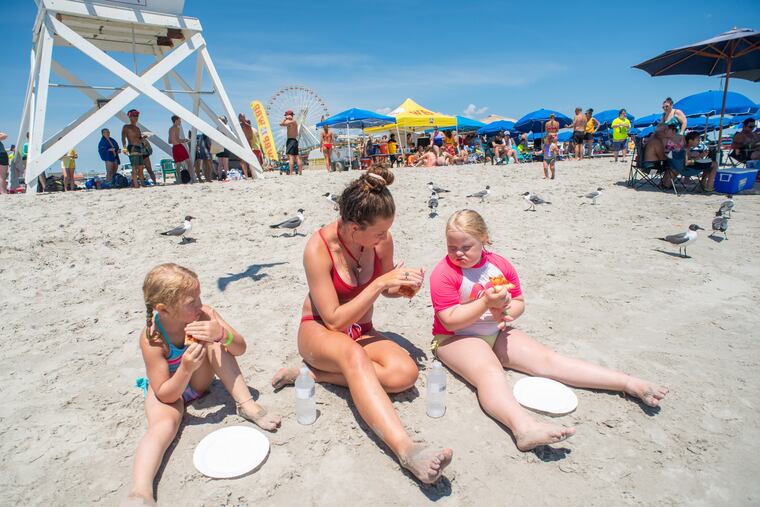Disabled kids like my daughter deserve summer fun, too
She has the same basic desires of any other kid: the opportunity to belong, and the occasion to thrive — in the water or out. Yet too few spaces can accommodate her.

My 11-year-old daughter, Fiona, loves the water. She also can’t yet swim. Born with a rare chromosomal syndrome, she learned to walk at age 4 and talk (with the help of an iPad) at age 5. Learning to swim will require extra time and effort.
This is why I emailed our local swim club owner in South Jersey this summer, explaining my daughter’s needs. Did he think the swim team could be an appropriate place for her to improve her water skills? He replied that he thought it was a great idea. He double-checked with the coach, who said we should come to practice the following week and give the experience a try. I proceeded with the terrible elixir of false hope.
“True inclusivity requires commitment.”
Forty kids sat on the edge of the pool. Cramped several to a lane, they wore caps on their heads and pulled their knees to their chests, waiting for instructions. We introduced ourselves to two female coaches. They were friendly but seemed puzzled by our presence. They introduced us to a male coach, who grunted and avoided eye contact. One of the female coaches told us to find a spot at the end of the row of swimmers.
“Should we put on her life vest?” my husband asked. My daughter had taken swim lessons before, and the instructors had used pool noodles and kickboards. The coach shrugged and said, “If she needs it.” Then she walked away. We squeezed into a spot by the pool steps.
The male coach shouted at the kids to listen up. “If your group isn’t called, then you shouldn’t be in the pool!” he hollered. The two other coaches stood quietly on the sidelines. Then he called kids lane by lane, and they plowed into the water headfirst. They swam to the other side with zero assistance.
My daughter burst into tears — not because the coach had yelled with surprising vitriol, but because her lane wasn’t yet called. “Get in yet? Get in yet?” she repeated, weeping in a turquoise life vest as other groups dived into the pool. I tried hard and succeeded to not shed tears. There was no way this swim club was designed for a kid like her. She’d need an adult in the water. She’d need guidance and physical support. She’d need directions, repeated often — and she deserved them spoken with kindness because her confusion wasn’t her fault.
» READ MORE: To solve staffing shortages, hire more workers with disabilities | Opinion
Families like mine who are looking for summer activities have the additional burden of trying to figure out if kid-centered spaces are truly designed for kids like ours. Often, they aren’t. When we double-check, well-meaning folks — or maybe just folks who’ve caught a whiff of how popular the word inclusive is — tell us we are “welcome.” But then they proceed with business as usual. And at $1,000 for a summer membership, our local swim club is very much a business.
I’ve heard of similar stories at churches, camps, and birthday parties. “Sure, your kid is welcomed,” people say to parents of neurodivergent kids, but they don’t ask follow-up questions. They don’t inquire: “What does your child need?” They don’t walk the parent verbally or physically through the environment and seek suggestions about how to modify it. They don’t do the actual work of creating an inclusive space. It’s like waving a person in a wheelchair up the famous Rocky Balboa steps of the Philly Art Museum, crying: “Come on up! You’re welcome!”
True inclusivity requires commitment. In the case of the swim club, a little understanding would have carried us leagues. The owner could have asked follow-up questions over email. The coach could have communicated to the other coaches that we would be present. One of them could have supported our daughter down one length of the pool. All of it would have taken something smaller than a seed but just as large in impact as a tree: the belief that we are not inconvenient, that we deserve to be there.
Sadly, summer spaces for kids like mine are slim pickings. We parent the kids people call “special needs,” but the preciousness of this phrase masks the reality. Kids like my daughter sometimes need hand-over-hand guidance. They sometimes need quieter volumes — or louder ones. They might need directions repeated, or broken down into smaller steps, or visually illustrated. Above all, they need organizations and adults who understand that their differences should not preclude them from participating.
Because as much as disabled kids have additional needs, they also have the same basic needs as any other kid: the opportunity to belong, and the occasion to thrive — in the water or out.
Heather Lanier is a writing arts professor at Rowan University and the author of Raising a Rare Girl. @heatherklanier